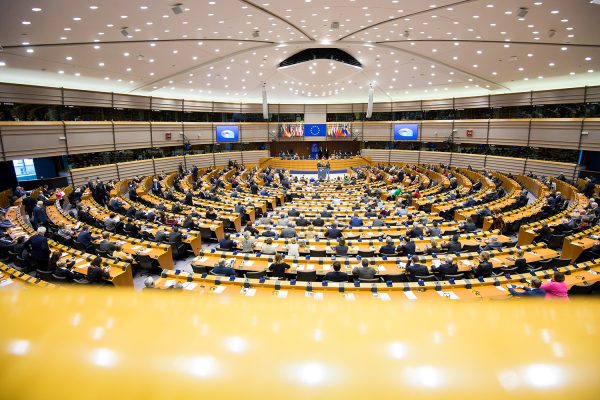
Expect to read this headline a lot between now and the European elections in May: “Euroskeptics to take fifth of European Parliament seats.”
It sounds scary, but it’s really not much of a change and what’s happening on the pro-European side is more interesting.
Grand coalition
According to seats projections published by the European Parliament itself, parties that do not oppose the EU, ranging from the far left to the mainstream right, are still set to take 542 out of 705 seats, down 33.
The most consequential development is that support for the center-left Socialists and Democrats (S&D) and center-right European People’s Party (EPP), which have formed a grand coalition in the European Parliament for almost the entirely of its forty-year existence, has dropped below 50 percent for the first time.
Liberals
The Greens and liberals (ALDE) could make up the difference. Especially when French president Emmanuel Macron’s party is projected to win around twenty seats, which aren’t added to any group yet. Macron has allied with ALDE but not joined the party.
The expectation is that he and Dutch prime minister Mark Rutte, the other leading liberal in Europe, will try to leverage ALDE’s position to get either the presidency of the European Commission or the European Council for themselves.
Even without counting Macron, the liberals are projected to gain seven seats and overtake the mildly Euroskeptic European Conservatives and Reformists (ECR), who will be led by Poland’s ruling Law and Justice party following the departure of Britain’s Conservatives. ALDE is eying gains in the Czech Republic, Germany, the Netherlands and Spain.
Center-left
Brexit will be even more damaging to the center-left. The British Labour Party is the currently the third largest party in the S&D, after the German and Italian socialists. They are projected to lose seats too; in the case of Italy’s Democratic Party, half their seats.
With the notable exception of Spain, where Prime Minister Pedro Sánchez is leading a fairly popular minority left-wing government, social democrats are in retreat across Europe. Their voters are defecting to the Greens, especially in Northwestern Europe, and the far right.
Euroskeptic right
The biggest Euroskeptic gains are in Italy, where the ruling Five Star Movement and far-right League are projected to dominate the Italian delegation; France, where Marine Le Pen’s National Rally continues to grow; and Germany, where the far-right Alternative is projected to go up from one to twelve seats.
But the Euroskeptics have historically struggled to unite.
The more strident anti-immigrant parties group in the Europe of Nations and Freedom (ENF), which in addition to the League and National Rally includes the Freedom Parties of Austria and the Netherlands.
The Five Star Movement could become the leader of Europe of Freedom and Direct Democracy (EFDD) following the United Kingdom Independence Party’s departure from parliament — assuming Brexit isn’t delayed and EFDD survives without Nigel Farage.
The ECR has become the bloc of the “respectable” Euroskeptic right, including Belgium’s New Flemish Alliance, the Danish People’s Party and the Finns Party. Some of the smaller parties currently in the ENF and EFDD may attempt to join it in order to gain influence and prestige.
